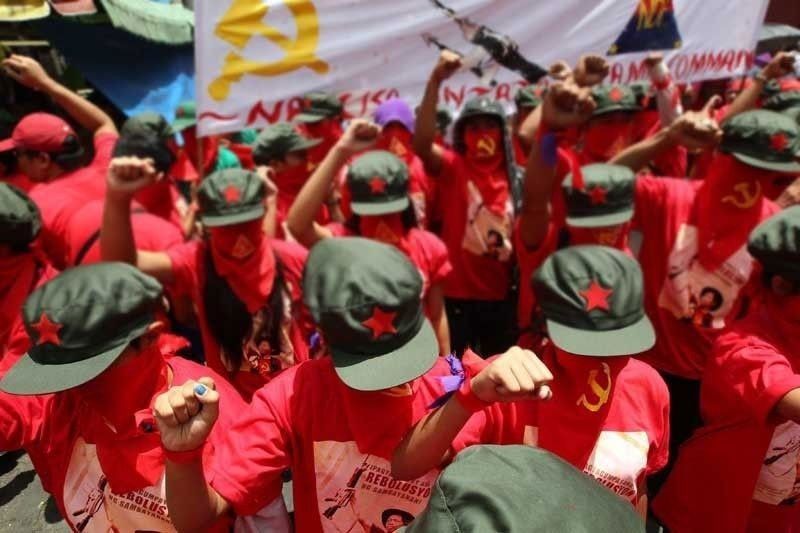Right-wing party-list wants CPP-NPA-NDF outlawed. But is this constitutional?

MANILA, Philippines — A right-wing party-list group filed this week a bill that seeks to outlaw the Communist Party of the Philippines, its armed wing, the New People’s Army, and the coalition of revolutionary organizations, the National Democratic Front of the Philippines.
It is essentially a proposal to revive Republic Act No. 1700 or the Anti-Subversion Act first enacted under President Diosdado Macapagal. It has similar trappings of the now-repealed law, including a declaration that the CPP-NPA-NDF is “an organized conspiracy to overthrow” the Philippine government.
This is not the first time that some quarters made calls for the revival of the law repealed during the time of President Fidel Ramos as former Interior Secretary Eduardo Año pushed for this in 2019, to the opposition of then Justice Secretary Menardo Guevarra and then Senate Minority Leader Franklin Drilon.
Drilon, who was Ramos’ justice secretary at the time of the repeal of the Anti-Subversion Act, said in a statement then that the law was repealed because of the perceived infringement on the constitutional rights of an individual.
“The anti-subversion law was ‘buried’ a long time ago for it was proven that such policy, aside from being prone to abuse and a tool to harass, undermined some of our basic constitutional rights,” Drilon said.
But Rep. Drixie Cardema (Duterte Youth party-list) begs to differ. In her explanatory note for House Bill No. 4324, she argues that her proposal to outlaw the CPP-NPA-NDF is constitutional as President Corazon Aquino continued the policy of declaring membership in these underground communist organizations illegal.
“Under President Aquino, the 1987 Philippine Constitution was created in October 12, 1986 and was ratified by the Filipino people in February 2, 1987. Clearly there is no violation of the said current Constitution, no freedom or right trampled upon when the very same president ordered the revival of the Anti-Subversion Act on May 5, 1987 through her Executive Order 167 and on July 25, 1987 through her Executive Order 276,” Cardema said.
Bill of attainder
For National Union of Peoples’ Lawyers president Edre Olalia, however, Cardema’s bill is “inherently infirm.”
“It is replete with badges of a bill of attainder despite the token formality of supposed judicial oversight and determination of guilt, especially with the unilateral particularization of specific organizations,” Olalia said in a message to Philstar.com.
Article III, Section 22 of the 1987 Constitution prohibits the enactment of bills of attainder, which are legislative measures that impose punishment on people without the benefit of a trial.
In 2019, Bayan Muna president Satur Ocampo wrote in his column for The STAR about a 1964 essay by Reynato Puno, who would later on become chief justice, published in the journal Progressive Review arguing that the Anti-Subversion Act was a bill of attainder.
In the essay, Puno as quoted by Ocampo argued that members of the CPP were made “guilty of subversion” and condemned membership in it “without judicial trial.”
This, Puno argued, “violate[d] the very essence of procedural due process… which hears before it condemns, which proceeds upon inquiry, and renders judgment only after trial.”
Eight years after the publication of Puno’s essay, the Supreme Court ruled that the Anti-Subversion Act is not a bill of attainder, saying in People vs. Ferrer that the subject of the law is “not on individuals but on conduct.”
“It does not specify the Communist Party of the Philippines or the members thereof for the purpose of punishment. What it does is simply to declare the party to be an organized conspiracy for the overthrow of the government for the purposes of the prohibition … against membership in the outlawed organization,” the court said then.
Besides, the court said, alleged members of the CPP still had to be charged in court for the government to secure punishment against them, quashing the argument that the Anti-Subversion Act was a bill of attainder.
“It is only when a statute applies either to named individuals or to easily ascertainable members of a group in such a way as to inflict punishment on them without a judicial trial does it become a bill of attainder,” the court said.
Danger?
Besides raising the possibility that Duterte Youth’s push to revive the Anti-Subversion Act is a bill of attainder, Olalia said the measure is “riddled with legally illiterate deficiencies as it uses a lower standard of proof i.e. prima facie instead of probable cause.”
The bill lists 12 acts that “constitute prima facie evidence of membership in the CPP-NPA-NDF and in organizations supporting its recruitment, operations and financial transactions,” which Olalia panned to be “overly broad, amorphous and nebulous.”
“This will essentially criminalize ordinary acts or completely innocent interactions with anyone suspected of being a rebel or red-tagged as such,” he said.
He called the proposal “bigoted and repressive” which he said is a “crude attempt to to circumvent evidentiary rules and standards.”
Reacting to the filing of the bill, Rep. Raoul Manuel said Duterte Youth “is advocating for violence and the extermination of thousands of innocent Filipinos, along with community leaders, celebrities, athletes, government officials, organizations, businesses, churches and institutions that have become victims of red-tagging by government officials.”
Puno, in his essay quoted by Ocampo, said the danger of the Anti-Subversion Act “lies in the possibility that this power could be exercised as a means by which to exterminate the minority in order to satisfy the distorted ambitions of the temporary majority.”
He continued, “If this could be done to the CPP, it could be done to other harmless associations, to other rebellious individuals. It is, as it has been, the weapon of tyrants as well as despots of history.”
- Latest
- Trending































